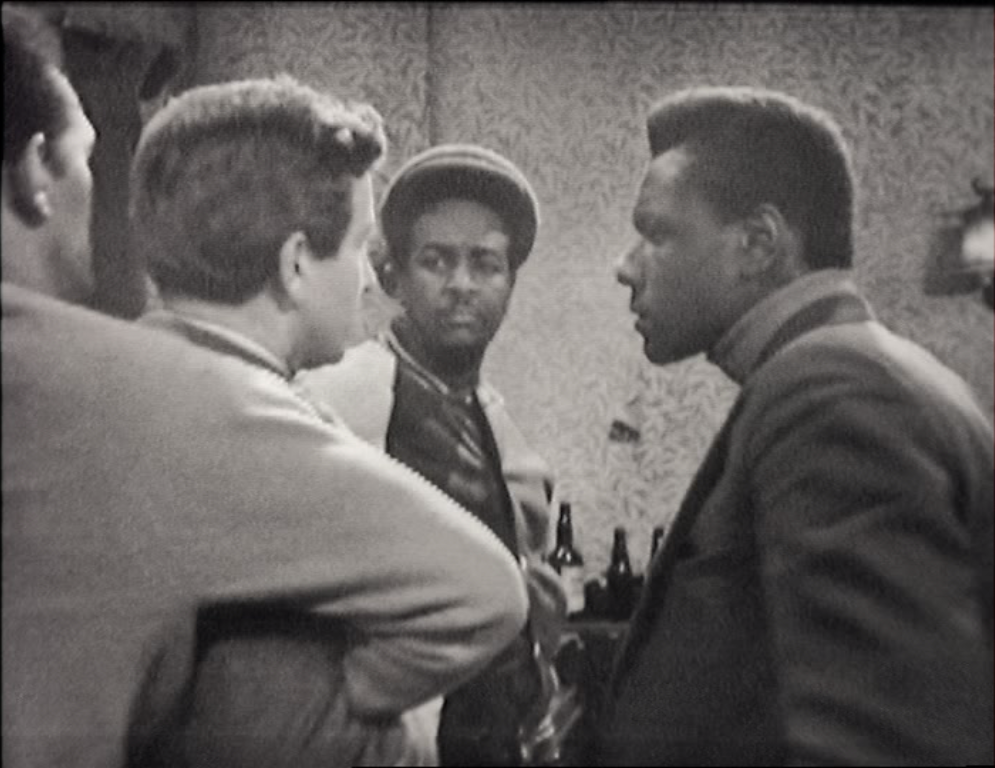Tonight's It's Dark Outside tackles what, 1964, would have been widely known as Rachmanism (after the infamously unscrupulous property developer - and former lover of Mandy Rice-Davies - Peter Rachman): the process of filling properties up with ethnic minority tenants barred from most other accommodation, charging them scandalously exorbitant rents and meeting any dissent, or failure to pay, with extreme violence.
Alfred De Souza (Charles Hyatt) is an apparent victim of this violence. He claims he fell up the stairs, but Sergeant Swift, called in after a pair of elderly sisters across the hall dialled 999 on witnessing him being attacked, can see that his injuries were caused by a vicious dog.
Meanwhile, Anthony Brand is preparing to attend a regimental reunion. His smugly leftist wife Alice inevitably mocks his medals, claiming she last saw them at Christmas: "I put them away with the other decorations". Nonetheless, relations seem to be improving between these two since last week, and they plan a romantic weekend in Paris. Alice, however, is still enjoying her inevitably doomed liaison with Swift, who contacts her to suggest she write an article about the conditions De Souza and his fellow tenants live in.
Inspector Rose, a member of the same regiment as Brand, reluctantly attends the same do. As he complains to Swift, "The cowards have blossomed into braggarts, the true heroes are all dead". One such braggart is the event's interminably dull convenor (Donald Eccles), who reacquaints Rose with a Lieutenant Miller (Tony Steedman) who he briefly met once many years ago.
Miller's presence means little to Rose, but it has a big effect on a strangely panicky Brand. Miller seems to find Brand's name oddly familiar too.
Alice gets to work on the story Swift suggested by interviewing the spinster sisters (Nora Nicholson and The Plane Makers' Aimee Delamain). They claim to be bewildered by the changes that have happened to the house since the "coloured people" came to live there and the rent rose so steeply, but they were born there and are determined that they'll die there. What's more, they've become quite fond of their neighbours, and enjoy learning about the far-flung corners of the globe they hail from.
Meanwhile, the hallways are stalked by an enforcer known as The Leopard (Dan Jackson), who has a very big dog (whose fearsome growls are all too obviously dubbed on: the beast itself looks perfectly placid).
At the regimental bash, Inspector Rose, likeable git that he is, is having a great time observing Brand's discomfort over Miller. It turns out Miller and Brand both served in Greece, where Miller was imprisoned and sentenced to death for killing Greek citizens - which the authorities were informed about by another officer looking to save his own skin. The realisation is dawning on Miller that Brand was the man who betrayed him. Miller, infamous among the other members of the regiment as a freeloader, sees in this first and foremost an opportunity to make money, starting off by getting Brand to stump up for his membership fee.
Alice and Swift want to speak to De Souza, and head for the tatty club where he plays the drums. The bar staff consists of a raddled old woman who sits knitting, and the clientele are mainly black. To complete this vivid portrait of London lowlife, the manager is a screaming queen called Bobby Bascombe (played with great gusto by Jerome Willis), who turns out (of course) to be an old friend of Alice's.
I think It's Dark Outside is the first show I've featured at TV Minus 50 to feature unequivocally gay characters, with Bobby joining Aubrey Morris's character from the first episode. He's a slightly more encouraging depiction, a happy-go-lucky, Julian and Sandy-esque character, despite his insalubrious surroundings. Thought the fact he's attracted to a character played by Keith Barron means even the most committed of homosexuals will probably consider him a dangerous pervert.
Tearing himself away from Bobby's attentions, Swift goes to see De Souza. The drummer still claims he fell, but his panic when Swift voices his concern that he might have caught rabies gives the game away.
Meanwhile, Brand has shared a taxi back from the reunion with Miller. Accompanying him into his flat, he insists it wasn't he who betrayed Miller. But, er, just to stop any nasty rumours getting about he gives him £10. It seems likely this won't be the last money he gives his former comrade.
It's Bobby, who makes short work of the crooks. I was convinced I knew what was going to happen here. He'd suddenly come over all butch, and it'd turn out he was an undercover man all along, the effeminate persona just a front. Thrillingly, that doesn't happen at all. He explains to Swift that four years in the Hong Kong police made him an expert in unarmed combat, but he's still just as much of a queen as ever. A camp gay man who can not only handle himself in a fight but comes to the hero's rescue seems a radical idea even today. And this was in Nineteen-Sixty-flippin-Four! It's astonishing to see. In a wonderful parallel universe, Bobby got his own spin-off series after his appearance in this episode, a cross between The Avengers and Round the Horne.
Amid this excitement, the revelation that the elderly sisters were the evil landlords all along barely registers (though the pulling back of a curtain to reveal them, and the image of Aimee Delamain in a wheelchair toting a vicious dog certainly add to the episode's camp value).
The episode ends with Brand returning home, his guilt-ridden demeanour baffling to his wife (whose heavily made-up face, it must be said, looks terrifying out of focus). There are two episodes left in this series of It's Dark Outside, and it seems a safe bet that the issue of Brand's less-than-honourable past is going to raise its head again...




























































